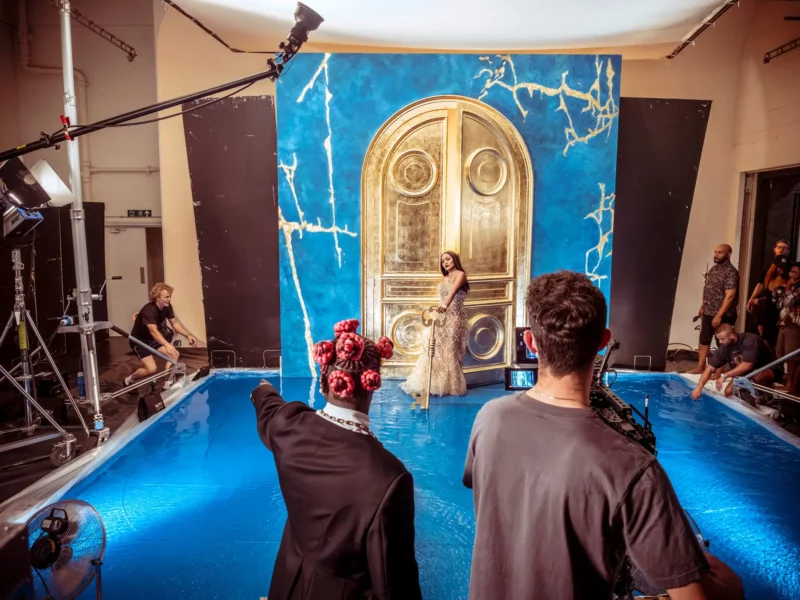A Landmark Year for a Rare Calendar
Share
Explore Our Galleries
Breaking News!
Today's news and culture by Black and other reporters in the Black and mainstream media.
Ways to Support ABHM?
By Elizabeth Paton, New York Times
After 60 years, the Italian tire company Pirelli hired a Black photographer to produce its not-for-sale calendar, which has evolved from a showcase of (scantily clad) bodies into a vehicle for ideas.

Wearing a gold strapless gown, Angela Bassett stood before two massive gilded doors while resting one hand on a giant key. She was standing inside a shallow makeshift pool that had been set up inside a heavily guarded photo studio on a muggy Thursday in June. Around the pool’s edges, assistants were crouched down and slapping the water with their hands to make waves that lapped at Ms. Bassett’s feet.
The actress had come to the studio on an industrial street in north London at the invitation of Prince Gyasi, 28, a Ghanaian artist and the photographer of the 2024 Pirelli calendar: a lavishly produced promotional product bankrolled by that Italian tire manufacturer. It is not sold, but instead given to a group of around 12,000 clients, public figures and people Pirelli deems influential, which has made it a sort of collectible.
[…]
While Pirelli has yet to make its calendar widely available since first releasing it in 1964, the company has lately sought to make it appear more accessible. It hired Mr. Gyasi, who is from Accra, Ghana, to produce the calendar at a time when African creatives across fashion, music, film and art are enjoying overdue interest and influence on the global stage.
In recent years, Pirelli has mostly moved away from the overtly sexual photographs of scantily clad women that characterized the calendar for decades after it was introduced as a type of high-end pinup amid the sexual revolution. Instead, the company has sought to use the calendar as a form of cultural commentary on issues like race (the 2018 edition featured an all-Black cast) and gender (the #MeToo-inspired 2019 edition aspired to portray its female subjects as dreamers and thinkers).
Though the images in the calendar have become more diverse, the 2024 edition was the first installment produced by a Black photographer.
Known for making bold, colorful images, Mr. Gyasi, who is also the first African photographer to shoot the Pirelli calendar, has tried to challenge traditional narratives about Africa as well as Western beauty ideals in his work. He said the opportunity to shoot the calendar was too good to turn down, partly because he would be following in the footsteps of celebrated photographers like Annie Leibovitz, Tim Walker and Albert Watson.
For his edition, which focuses on the themes of Black empowerment and mastering time, Mr. Gyasi also assembled an all-Black cast. Along with Ms. Bassett, it included the actor Idris Elba, the supermodel Naomi Campbell and the Nigerian pop star Tiwa Savage. Everyone featured in the calendar has inspired him, he said, “at times when I’ve thought cracking the ceiling and to belong in certain spaces was just not possible.”
Representation is important for Black models as well as artists.









Comments Are Welcome
Note: We moderate submissions in order to create a space for meaningful dialogue, a space where museum visitors – adults and youth –– can exchange informed, thoughtful, and relevant comments that add value to our exhibits.
Racial slurs, personal attacks, obscenity, profanity, and SHOUTING do not meet the above standard. Such comments are posted in the exhibit Hateful Speech. Commercial promotions, impersonations, and incoherent comments likewise fail to meet our goals, so will not be posted. Submissions longer than 120 words will be shortened.
See our full Comments Policy here.